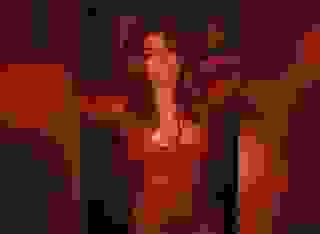Note: You can change font size, font face, and turn on dark mode by clicking the "A" icon tab in the Story Info Box.
You can temporarily switch back to a Classic Literotica® experience during our ongoing public Beta testing. Please consider leaving feedback on issues you experience or suggest improvements.
Click here"I guess that's worse than being replaced by a robot, like I'll be, someday." Cob isn't sure if helicopter pilots, or pop singers, will get replaced first. But for now, the day is theirs.
He dons the headset and passes the second pair to Andromeda. Then turns on the avionics.
"Hear me?" he asks.
"Yep. Loud and clear."
Cob tunes to the area forecast, on the VHF radio. While listening to the broadcast, he sets the engine levers, adjusts the altimeter to the barometric pressure, sets the switches for the beacon and tank-select, then loosens the friction-locks on the controls.
Andromeda sits there, calmly, while Cob reaches under her legs to loosen the locking screw on the pilot's control stick, located between her calves. She is used to having people tend to their specialties around her, while she's on-set. This is less intimate than wardrobe, or makeup, stepping in. She can tell he's being careful not to touch her.
"Excuse me, again," Cob says, reaching across to the left of Andromeda. "This is the fuel cut-off lever, on your left. Don't move it from this position, unless I ask you to. If you do, the engine will die, after the carburetor bowl runs dry."
He talks aloud, as he finishes the checks. "Mixture, full rich. Carb heat, cold. Circuit breakers, good. Master, on. Generator, on. Gauges, looking normal. Rotors, free. Doors, off. Harnesses, on."
Cob manipulates the collective lever and its throttle-grip, in a well-practised movement that's used to prime the engine.
He looks around the exterior of the aircraft, then yells, "Clear!"
"Okay, Andromeda. See that red button on the end of your collective lever? That's the starter button. Press and hold it until you hear the engine fire. Like a car, except crank for longer, like five to ten seconds."
"Here goes," she says, with a grin.
Cob waits for the engine to turn through three compressions, then flicks the magneto switch to 'both.' The engine fires up immediately, so he checks that Andromeda has released the starter button, as he adjusts the throttle to a fast idle, while the rotor blades accelerate.
"Okay, oil pressure rising. Rotor RPM climbing. Just like yesterday, when these two needles converge on the tachometer, it means the clutch has fully engaged the engine with the rotor shaft. So we can bring the engine up to twenty-four-hundred and let it finish warming up. Do you want to do it? Just like yesterday, twist the hand grip outwards on your collective lever, just a little bit, then see where the RPM ends up."
The helicopter feels alive now. The noise, vibrations, and smells, adding to the stroboscopic effect of the spinning rotors, casting fleeting shadows in the sunlight. Andromeda is silent, as she tries to absorb all the sensations. The rotors are spinning faster than yesterday, the machine seems more alive.
The manual calls for a five-minute warm-up, from a cold start - even in the heat of the tropics. So Cob is in no rush, as he watches the gauges.
"Mind your knees," he says, before moving the cyclic control stick in an 'X' pattern, and then circles through its whole range of movement, checking for full-and-free motion. "See how the rotor disc moves with the cyclic stick? This type doesn't have a rigid rotor hub. So the cyclic stick controls the tilt of the rotor disk, and the fuselage just hangs off the center of it, like a pendulum. If we misuse the controls, the rotors can strike the tail."
"What happens then?"
"Then we'll be landing, in a hurry. Ballistics will choose where, and how hard. Just don't make big fore-aft movements of the control, especially at slow speeds. Put your right hand lightly on the stick and follow along - you'll see we only need small inputs to make her do what we want," Cob says. "We're up to temp, now. I'll just make a radio call."
Cob presses the radio's transmit button on top of his cyclic stick, "All stations south Eleuthera, helicopter Charlie Six, Bravo Echo Lima, performing air work to the west of Freetown, below one thousand."
He listens for a reply, but isn't expecting any. The airspace around the island is usually quiet on weekday mornings.
"Okay, here we go," he says, pulling up slowly on the collective lever.
As the rotor blades change pitch and bite into the air, the downwash causes sand to be lifted out of the crevices in the tarmac and blow about, forming their own little snow-dome of particles. There's some buffeting in the cabin, too, without the doors, but the air is already warm enough to negate any wind-chill effect.
"Okay, the balance point is about there, on the stick. We'll need some left pedal in the hover. Watch as the weight comes off the skids, then we'll correct any sideways movement that happens," he says.
"Ooh. Ha-ha," Andromeda responds, in delight, as the aircraft raises into a hover, a few feet above the ground.
"Pedal turn to the left, and we'll taxi over and use the old runway."
"Why do we need the runway?" Andromeda asks.
"It's clear of trees. So we can accelerate while we're close to the ground, then climb out above sixty miles per hour. It's the same as the landings I was talking about. We try to avoid slow flight between about fifty, and three-hundred feet. If the engine fails in that zone, we won't have enough height, or speed, to do an auto-rotation - that's a landing without engine power."
"You can do that? Land without the engine?"
"Certainly. I wouldn't trust my life solely to a piston engine - I want options if it fails. So, with the collective lever all the way down, there's negative-pitch on the blades. As we fall through the air, the motion will keep the blades turning, like an auto-gyro, or a falling sycamore seed. Then, when we get near the ground, we can flare out, and use the inertia of the blades to touch down gently, with practice. There's nine pounds of metal at each end of the main rotor blade, enough to store some rotor energy for a touchdown."
Cob is taxiing at a jogging pace, five feet above the ground, when he reaches the old runway, he slows to a hover again, followed by a rudder turn to the left. Facing down the runway with the sun behind them.
"Now, watch the rotor disc as I push the cyclic forward. It'll tilt in that direction and we'll be dragged along with it."
Cob moves the cyclic forward and pulls up on the collective lever, to keep the aircraft at the same altitude as they accelerate. Andromeda spontaneously begins to giggle at the sensation.
"Oh my gosh! It's incredible," she says.
As the airspeed passes 65 miles per hour, Cob pulls back slightly on the stick and they climb above the trees, gaining altitude quickly to level off at five-hundred feet.
"Look at the ocean!" she says, looking out each side.
"Yeah, it's a rush," Cob agrees, "she may be old, but she's lighter than the early Corvettes, with more torque than the latest ones."
"Okay, turning to the right," he continues. "When we film you, we'll make most turns to the left, since that's the side you can see best - or the camera can see you the best. But we'll fly east, for now, up the beach, and make a turn around the marina. No point rushing over to the beach site, it'll take the crew some time to drive there."
Andromeda has gone quiet. Cob looks across at her. She's still smiling, and trying to look everywhere, including a quick glance back at him. Cob loves this part of the job; taking an enthusiastic passenger for their first flight. It reminds him of his introduction to helicopters.
~
Once the shoot has relocated to the beach, the rest of the day passes quickly. Andromeda and Cob are seldom out of the helicopter, only taking ten- or fifteen-minute breaks - eating lunch, or refueling, while the cameras get reset to new angles. They plan each flying sequence on the ground, rather than over the radio. They're both thankful, whenever airborne, as the wind through the cabin keeps them both cooler than the production crew, who are working on hot sand and asphalt.
By noon, Cob has taught Andromeda the basics of the controls and she is doing a little of the flying, including controlling the pedals for the landing approaches, towards the camera. This allows Cob to hide his left leg behind the instrument binnacle, and keep his right boot out of the sunlight, making his presence less obvious to the camera.
~
The flying is over all too soon. By mid-afternoon they are back at the original set, on the abandoned airfield. Aki's team are removing the camera mounts from the helicopter, while Cob retrieves the doors and refills both fuel tanks. Somebody has already taken the mannequin off the cargo tray, he notices. 'Maybe the dancers will have more luck with it, instead of the real Mark?' he considers.
As the activity winds down, most of the production team have gathered near the helicopter. Jaylen and Aki are pleased with the day's filming. Even Millie has put away her camera-phone - she has enough footage, too.
Eduardo jogs over to the group to discuss something with them.
"I just had a call from Kyle, Andromeda's agent. He's landed her a spot on Good Morning America, tomorrow - but only if she's in the Times Square studio. They don't want a video call - they want her to co-host a segment."
"Jesus! What an opportunity. How's she getting there?" asks Millie.
"It'll be tight. The last flight from Nassau leaves at six-thirty. We can't quite get her there, by boat. But Cob can make it, if he'll fly her. You're headed for Nassau, anyway, aren't you?"
"I'd rather not," Cob responds.
"Kyle will pay. A bonus too, for the short notice," Eduardo suggests.
"It's not the money. There's sixty miles of water to cross and only one engine," Cob says.
Cob tries to think of an alternative. It would take them forty-five minutes to drive to Rock Sound Airport, where they might be able to hire another aircraft - and that may not be any safer. He recalls the crash of the twin-engine Cessna 402 in the North Bahamas, about twenty years ago. It was heavily overloaded, with an inexperienced pilot, and took the lives of nine people, including another young star named Aaliyah. That group had also come to the Bahamas to record a music video.
He knows the TV appearance would be a boost for her career. She has such an effervescent personality that viewers will certainly fall in love with her. At least he can offer an experienced pilot, a recently overhauled engine, and will be operating within the manufacturer's limitations. The other pilots on the island don't always tick every box. And, maybe, he was a little bit in love with her too, he considered.
"She'll need a life jacket," Cob says.
"Sure," says Eduardo, looking relieved, "I'll sort that out." Then he rushes off.
"And some clothes," Cob calls out, while looking at Millie.
"Need anything else?" Millie asks.
"You can help by putting the hinge-pins in these doors, when I lift them, please."
~
Fifteen minutes later, Andromeda is strapping into the passenger seat. Cob has reclaimed the left-hand pilot's seat. They're not filming anymore, so he wants easier access to the fuel cut-off lever, starter button, and landing light switch. Also, he can now reach the friction-knob on the control stick, without having to reach between Andromeda's legs. He's debating whether that's a pro or a con.
Cob scans down the instrument panel, tests the control movements, landing light, then looks across to the fuel cut-off. Reversing his scan, his eyes go back up the instrument panel, turning switches to the desired setting, including turning on the beacon light and avionics.
"Hear me okay?" he asks, through the headset.
"Affirmative," she answers.
"You're starting to sound like a pilot now," he smiles, before opening his door briefly to look at the tail rotor, then yells, "Clear!" He listens for a few seconds, then begins cranking the engine.
The engine starts easily, still warm from the recent flight. After bringing the engine up to 2,400 RPM, Cob sets the destination 'NAS' into the GPS navigator. It reports; 76.6 nautical miles at a heading of 283 degrees. Then he makes a radio broadcast to check for other traffic.
"Okay, temperatures are good, here we go," he states, over the intercom.
He lifts off and flies backwards for a few feet, before doing a rudder turn to face towards the old runway. He doesn't taxi there, this time. Andromeda is now comfortable enough in the helicopter that he can accelerate more aggressively, reaching their 65 mile-per-hour climb-out speed well before the runway.
As they pass through 2,000 feet, Cob makes another radio call.
"Nassau Approach, helicopter Charlie Six Bravo Echo Lima. Visual. Departing Freetown, en-route to Lynden Pindling. Two POB. Could I get a SAR-Watch for ninety-minutes please? Bravo Echo Lima."
"Roger, Bravo Echo Lima. SAR-Watch for twenty-forty Zulu. Squawk fower-fife-zero-niner. See you soon Cob."
"Thanks, Approach. Squawking fower-fife-zero-niner. Bravo Echo Lima," Cob replies, while setting the transponder code.
"Identified. Nassau Approach, out."
By the time they pass Powell Point Marina, at the western tip of the island, they have climbed through 5,000 feet. Cob is headed for 8,500 feet for a few reasons. He wants a reserve of altitude in case something goes wrong. They'll also have a higher ground speed in the thinner air, for the same apparent air speed and fuel burn rate. Lastly, it'll get cooler as they go higher - at 8,500 feet it should be around seventy Fahrenheit, he figures, rather than the ninety-two degrees they've been in at sea level.
Andromeda has her phone out, taking photographs.
"It's such a beautiful blue. It looks like it goes all the way to Nassau," she says.
"It does. We're flying over part of the Great Bahama Bank. It's a carbonate platform, formed by coral. Eleuthera is on the east side and Nassau, on the west. So it's all part of the same shelf, and it'll be shallow water all the way. We'll pass a few coral islands, and some sand islands out your side, but there's deeper water out my side. Until we get to Exuma Cays, about halfway across."
"You sound like a tour guide. I guess it's part of the job?"
"Sometimes. Other times, people just want me to shut up and fly."
"And what about me? Am I an annoying passenger who talks too much?" Andromeda asks.
"You're one of my favorite passengers. You talk about my favorite subject - flying."
"Are you trying to earn a tip? My manager is paying for the flight - you'll have to be nice to him," she jokes. "Anyway, I think it's fascinating. Exciting. I can't believe others don't feel the same way. Why do they hire you then?"
"I guess it's expected of them. It's how rich people are supposed to get between the casino and their yacht. They don't care for the flying - it's about appearances. I mean, a lot of them are wearing wristwatches worth more than this helicopter - Patek Philippe, Vacheron, Piaget, or maybe they'll skimp on a Rolex or Omega, if they're headed to the beach. A helicopter is nothing special in their world, it's just a tool, until someone invents a teleport machine."
"Teleporting sounds boring. You'd miss out on this view," she says, waving her hand ahead. "I can't believe they get numb to all this."
"Yeah. All that money, and they still wake up grumpy and rude. Try not to get like that when you're rich."
"Ha! Between the record company and my agent, I won't see much of it. But if my second album is a hit, I might just learn to fly a helicopter. Are you up for teaching me?"
"Normally, I don't like teaching the rich and famous - they can lack judgment. But I need their business."
"What do you mean they lack judgment?"
"Their whole life, they've always had someone to save them from their own mistakes, like a lawyer to get them off a drunk-driving charge, or a discreet donation to get them into the right college. But there's no safety net if you don't respect a helicopter. I think that's why so many of them have died while piloting them. I do check-flights for some, for their currency and re-certification. Some of them are shockers. If I don't like their attitude or aptitude, they either get better, or go elsewhere."
"Oh. So you won't teach me?"
"I don't think my anti-rich stereotyping applies to you - I've already started teaching you. You've got a real interest in the art of flying. Anyway, you're not from an 'old money' family, I'm guessing?"
"You're right about that. My father died when I was eight, hit by a train at a level-crossing. Mom struggled to feed us sometimes. I'd take care of my younger sister, while Mom worked multiple jobs. We couldn't afford child care, but she always found money for my dance classes and singing lessons. I owe her so much. So if I do get rich, I'll make her comfortable first."
"That seems appropriate, your mom deserves it," Cob says, with a quick glance.
"For letting me sing and dance?"
"For lots of things. For teaching you to respect people. Be considerate. To chew with your mouth closed - that alone is a blessing, these days. From what I see, your mom has raised a wonderful person. And I'm thankful."
Cob glances over at her, but she has her head turned away, looking out her door.
"What about you? Any family?" she asks.
"One daughter, who's seventeen. Lives with my ex."
"Ooh. Seventeen-year-old girls are right in my target audience," Andromeda laughs, turning her head back towards him.
"And I thought it was seventeen-year-old boys."
"They're easily pleased, the bikini does that. The hard work is the synchronized dancing - group cohesion - girls want to be individual, but still fit in... be accepted. That's what the backing dancers represent, so I've been told. Personally, I just love to dance."
They fly in silence for a while. Cob feels a little on-edge, more than he would expect for a water crossing. Maybe it's his semi-famous passenger. Or the mention of his ex-wife. The helicopter sounds different in the Peltor headset. Andromeda is still wearing the better, noise-canceling David Clarks she wore for the filming. The vibrations seem normal. Actually, better than normal, after the computerized balancing performed at the last major overhaul.
"What's your real name?" Andromeda asks, breaking the silence.
"Hmm. I'll tell you mine, if you tell me yours."
"Okay, deal. But you go first," Andromeda agrees.
"Henry," Cob says, "Henry Swanson."
"Oh. Cob is more interesting, I think I'll keep calling you that," she smiles at him, "My name is Kaitlyn Horton. Kate, to my friends."
"I like it. Do you mind if I call you Kaitlyn?"
"Not at all. But I'll class you as a friend - you can call me Kate, if you want."
"I like Kaitlyn. I wanted to call my daughter either Erin or Kaitlyn. But I've never known a Kaitlyn, until I met you."
"So, she's Erin?"
"Alana. That was my ex's choice."
"Does your ex have a name?"
"No," says Cob.
Andromeda decides to drop the subject and returns to looking at the patterns in the sandbars below. Cob returns to listening to the machine. It is making a different noise. The performance has dropped a bit too, they've slowed from 74 miles-per-hour, to just under 70. The GPS agrees, it's reading 63 knots of ground-speed. They've lost some power.
Cob turns on the carburetor heat. It's too hot for ice to be forming in the venturi, but he wants to see what happens. There's a bit more power loss from the pre-heated air, but no rough-running that would indicate melting ice, so he returns the lever back to 'cold.'
The odd sound is still there, and getting louder. A deep rattle at engine speed that sounds like a worn big-end bearing. He banks the helicopter into a right turn and resists the temptation to move the throttle. Dying engines have a tendency to quit when power changes are made.
"Sorry, we need to turn back to Rock Sound. We should have time to find you a light-twin, to fly you to Nassau," Cob announces, while also changing the destination in the GPS.








